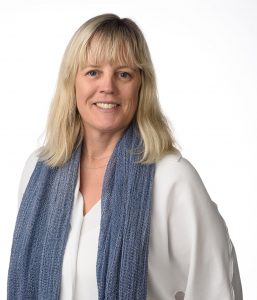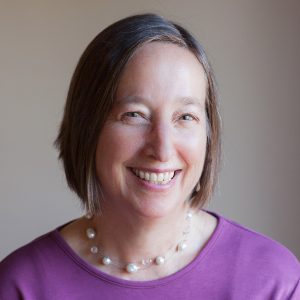
Dr. Maria Hubinette
Dr. Maria Hubinette has a vision to create more pathways to connect patients and community members with care providers, educators and researchers to improve the health care experience for everyone.
As the inaugural Canfield Distinguished Scholar in Patient Partnerships at UBC, she plans to build on the influential work of the Patient and Community Partnership for Education (PCPE) at UBC Health and the Centre for Health Education Scholarship (CHES). Her two main goals: to augment existing initiatives such as the sought-after Interprofessional Health Mentors program, and to pave the way for new ideas and opportunities for patients and community members to offer their expertise to support health education and health care decision-making.
“To me, it’s really inspiring to work with patients for whom the system isn’t working for a variety of reasons and learners motivated to make change and do things differently,” says Dr. Hubinette. “I can be an amplifier, a convener, a multiplier and a connector, someone who identifies what we can do collectively to support and inspire each other and build on this work. My role will be to create a network and community within the Faculty of Medicine, among UBC faculties, across Canada and internationally.”
Advocating for health equity
Dr. Hubinette has already played a key role in advocating for greater equity within the health sector through her academic and clinical roles.
In 2019, she was appointed the Assistant Dean, Equity, Diversity & Inclusion in the Faculty of Medicine, followed by a year with the office of Respectful Environments, Equity, Diversity & Inclusion, during which time she provided leadership to the faculty’s efforts to activate systemic and behavioural change.
As CHES Scholar and a 2021 Michael Smith Health Professional Investigator, she is leading research to address the experiences of populations within health education and health care who are impacted by racism, sexism or heteronormativity. For her commitment to elevating the quality of health education, as a clinical professor and the undergraduate program director in the department of family practice, she was recently honoured with a prestigious Killam Teaching Prize.
During her three year term as the Canfield Distinguished Scholar, Dr. Hubinette will continue to examine the policies, processes and practices that sometimes contribute to oppressive learning and health care environments, and to promote practical, evidence-based recommendations for medical schools to fulfill their commitment to social accountability—starting by involving affected people and populations in health education.
“The new accreditation standards for all medical schools in Canada focus on social accountability,” says Dr. Hubinette. “If we agree that our shared purpose is to meet the health needs of the people of B.C., then how do we operationalize that?”
Part of my role is to help programs such as the faculty’s medical undergraduate program know that we are making progress towards those really big and laudable goals. One important way to do this is to ensure patients and the public play a significant role in the education process.
Dr. Maria Hubinette
Amplifying patient and learner voices
UBC Health has already begun that work through the PCPE, which situates patients and community members with lived experience of the health system in classrooms, in research and at decision-making tables. Supported by both the PCPE and CHES, Dr. Hubinette will identify additional ways to amplify their voices, and the voices of students and faculty who are learning from them. In her experience, “change happens faster when learner voices, ideas and enthusiasm are involved.”
With patients and community members meaningfully and systematically embedded within the curriculum of health professions programs, and more scholarship demonstrating the effectiveness of this strategy for cultivating compassionate health providers, she sees an opportunity to make these transformative impacts more sustainable.
“There are a lot of great things happening, but they tend to be one-offs,” says Dr. Hubinette. “I am interested in how we grow the depth and scope of patient and public involvement. How can we make the involvement of community health educators an essential and embedded part of what we do as health educators.”
 Carolyn Canfield, who provided the inspiration and philanthropic donation behind the new leadership position, is familiar with the impact and potential of patient partnerships in healthcare and professional education. After her own experience with tragic health care failures, Canfield has found promise in finding ways to develop greater trust and collaboration within healthcare teams and between patients and providers.
Carolyn Canfield, who provided the inspiration and philanthropic donation behind the new leadership position, is familiar with the impact and potential of patient partnerships in healthcare and professional education. After her own experience with tragic health care failures, Canfield has found promise in finding ways to develop greater trust and collaboration within healthcare teams and between patients and providers.
On the strength of her experience, insights and ideas about the patient-provider relationship, she was invited in 2014 to join the department of family practice at UBC as a faculty member to teach patient safety and leadership to first-year medical and nursing students. Now, almost a decade later, Canfield is eager to help the PCPE expand the influence of patient, family caregiver and community perspectives in the learning environment for all health-related programs.
Inspiring and supporting connections
Canfield is delighted that Dr. Hubinette brings a qualitative research perspective to the role. “Her strong scientific grounding in qualitative methodologies not only positions her close to the experiences of people who are receiving health care, who are in relationships with health practitioners, it enables her to explore those experiences scientifically.”
Canfield also appreciates Dr. Hubinette’s familiarity with the history and theory behind the programs, the people and the resources available at UBC. “I have confidence that Maria will be able to develop great relationships across all our faculties and disciplines for more deeply involving students in patient- and community-led education, and to develop opportunities within an already full curriculum,” says Canfield.
Profound knowledge of this integrative perspective is only possible through learning from a person who has linked up all the health professions through the arc of their own health experience.
Carolyn Canfield
The feelings of respect and admiration are mutual. “People like Carolyn, who found a way to get involved and make a big difference, are inspiring and influential to my own thinking about the possibilities for involving more patients and the public in health education,” Dr. Hubinette says. “People doing great things inspire other people. That is part of the reason I want to enhance efforts to bring UBC students and faculty together with patients and community advocates.”
As they look to the future, Dr. Hubinette and Canfield hope more people will join them and help fund the work ahead to build excellence in patient partnership at UBC. “Donor funding creates opportunities to deepen and spread innovation. The Canfield Distinguished Scholar honorific supports me to support others. I want to be able to say, ‘you have some really good ideas and we have some resources set aside to make them happen.’”
To support the activities of the Canfield Distinguished Scholar, please make a contribution online here, or contact Olivia Peters (she/her) with the UBC Faculty of Medicine Development team at olivia.peters@ubc.ca.
